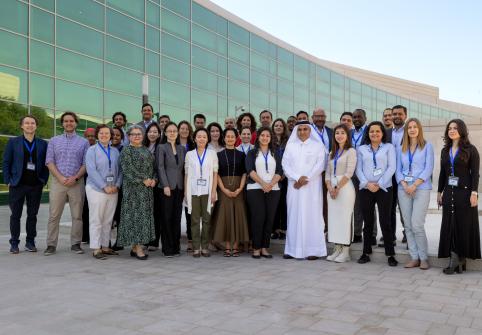News
HBKU’s QCRI and UN DPPA Celebrate Six Years of Innovation in Peace Technology
05 Mar 2024Partnership incorporates QCRI’s AI and computing expertise into full spectrum of UN endeavors

Hamad Bin Khalifa University’s Qatar Computing Research Institute (QCRI), together with the Innovation Cell of the Policy and Mediation Division at the United Nations Department of Political and Peacebuilding Affairs (UN DPPA), proudly mark six years of collaboration in pioneering new technologies aimed at fostering peace.
QCRI has been the host of the annual E-Analytics Innovation Lab in Qatar since 2019, a unique gathering that has brought together over 200 UN analysts and political advisers from around the world.
The Innovation Lab is at the forefront of exploring the application of emerging technologies in the realms of conflict prevention, peace negotiations, and peacebuilding. It delves into a wide range of innovative approaches, including Artificial Intelligence (AI), Big Data Mining, Virtual Reality (VR), and other cutting edge technologies.
Reflecting on this long standing partnership, Dr. Ahmed Elmagarmid, Executive Director,QCRI, remarked, "Our decade-long collaboration with the United Nations is a testament to the robust bond we share. This alliance has been instrumental in translating our avant-garde research into practical, real-world applications.Our collaboration spans the entire spectrum of the UN's endeavors, encompassing political, humanitarian, and developmental sectors, ensuring that our expertise in AI and societal computing is harnessed to its fullest potential."
Representing the UN DPPA Innovation Cell, Dr. Martin Waehlisch , shared insights into the recent E-Analytics lab session hosted by QCRI and involving over thirty UN participants. He noted that the workshop introduced participants to the extensive potential of data analytics and principles of design thinking.
“This combination strengthens our work on United Nations peace initiatives, offering new insights and approaches to tackling global challenges," said Dr. Waehlisch. He also highlighted the alignment of these efforts with the Secretary-General's UN 2.0 reform agenda, which is geared towards amplifying capacities in innovation, data, digital transformation, behavioral science, and strategic foresight. As he sees it, the initiative has culminated in the creation of tangible digital tools, notably DiplomaticPulse.org, an analytical tool and webscraper for diplomatic press releases, which garners thousands of monthly users seeking insights into global trends and developments.
Dr. Muhammad Imran, Senior Scientist, and Lead for Crisis Computing at QCRI, said: "Our comprehensive suite of crisis computing solutions, ranging from sophisticated social media analytics to predictive analytics applications for disaster impact assessment, underscores our commitment to aiding the UN in responding effectively to crises. It is a matter of immense pride for us to synergize the expertise of QCRI's top-tier scientists with the profound knowledge of our UN colleagues to address some of the most daunting challenges facing the world."
Looking ahead, QCRI and the Innovation Cell are poised to further amplify their collaborative efforts, with a host of innovative digital tools on the horizon, promising exciting developments and more groundbreaking advancements from this dynamic partnership.
HBKU’s QCRI conducts world-class multidisciplinary computing research that is relevant to the needs of Qatar, the wider Arab region and the world. The institution performs cutting-edge research in such areas as Arabic language technologies, social computing, data analytics and cyber security.
